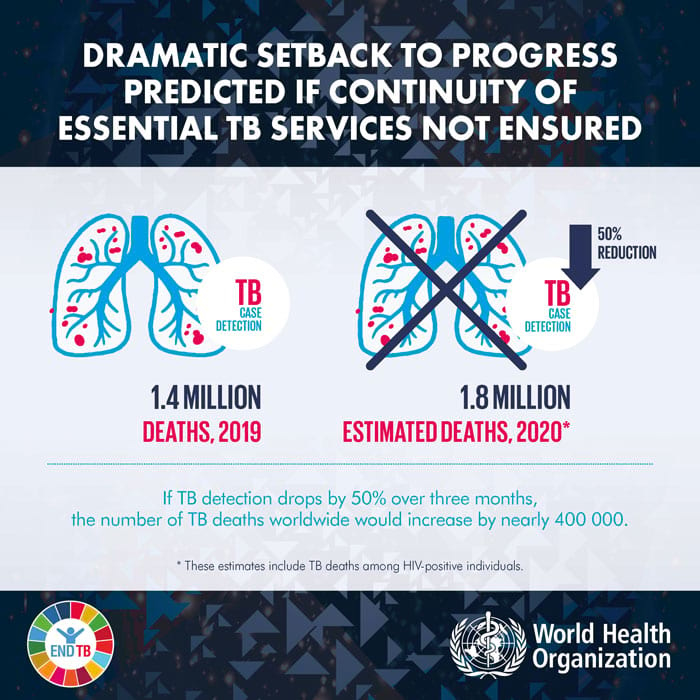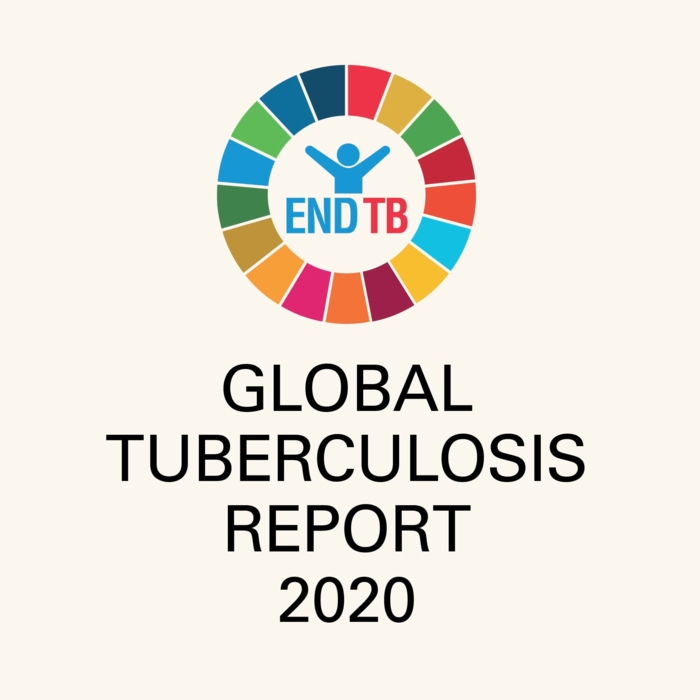Tuberculosis (TB) is one of the top ten causes of death worldwide and the leading cause of death from a single infectious agent. On October 14, the WHO presented its Global Tuberculosis Report 2020, which is based on data from 198 countries and territories, at a virtual press conference.
Long way from reaching global TB goals
In 2019, approximately 1.4 million people died from TB-related illnesses. Of the estimated ten million people who developed TB last year, some three million were not diagnosed with the disease or were not officially reported to national authorities.
The world as a whole was not on track to reach the End TB Strategy’s 2020 milestones at the end of 2019. Although the annual number of TB deaths and the rate of TB incidence are falling globally with a decrease by 9% and 14% respectively in the period 2015-19, progress is too slow to reach the 2020 milestones of a 35% and 20% reduction respectively in 2015-20.
According to the report, approximately 14 million people were treated for TB in 2018-19, just over one-third of the way towards the five-year target (2018-22) of 40 million. In 2020, funding for TB prevention, diagnosis, treatment, and care reached US$ 6.5 billion, representing only 50% of the global target of at least US$ 13 billion annually by 2022.
On a more positive note, a total of 46 countries, including seven high TB burden countries (Bangladesh, Kenya, Mozambique, Myanmar, the Russian Federation, Sierra Leone, and the United Republic of Tanzania), are on track to reach the 2020 milestones.
Drug-resistant TB continues to be a public health threat
The situation is acute for people with drug-resistant TB. Close to half a million people worldwide developed drug-resistant TB in 2019, corresponding to 3.3% of new TB cases and 17.7% of previously treated cases.
Less than 40% of people with drug-resistant TB were able to access treatment, and out of those who did, a staggering 80% faced catastrophic costs as a result. One critical target in the End TB Strategy is that no TB-affected family should face catastrophic costs. The strategy defines catastrophic costs as total TB care costs exceeding 20% of annual household income.
COVID-19 threatens to undo global TB progress
The 2020 edition of WHO's Global Tuberculosis Report includes a provisional assessment of how the COVID-19 pandemic will affect the TB epidemic, people with TB, and progress towards global TB targets.
The ongoing pandemic threatens to reverse recent progress in combating TB. According to the report, many countries report that both human, financial, and other resources have been relocated from TB to the COVID-19 response. Modelling suggests that if health services are disrupted to the extent that the number of people with TB who are detected and treated falls by 25-50% over three months, the world could look at an increase of TB deaths by between 200,000 and 400,000 in 2020 alone. In the next five years (2020-25) the number of people who develop TB could increase by one million annually as a result.
Furthermore, the pandemic's economic impact is predicted to worsen at least two of the key determinants of TB incidence: GDP per capita and undernutrition. When many families in low-income countries lose income as a result of the pandemic, the number of households that face catastrophic costs due to TB is likely to increase.

LINQ is highly committed to the fight against TB
The new report states that although progress continues to be made, urgent and more ambitious investments and actions are required to put the world on track to reach the End TB Strategy’s targets and the targets set at the UN High-Level Meeting on TB. This is especially true in the context of the COVID-19 pandemic.LINQ is highly committed to the fight against TB. By supporting our projects TriageTB, ENDxTB, PredictTB, and StatinTB, we hope to make a small contribution that helps reduce the global TB burden. We are proud to collaborate with many deeply dedicated and talented scientists in the field of TB research.


